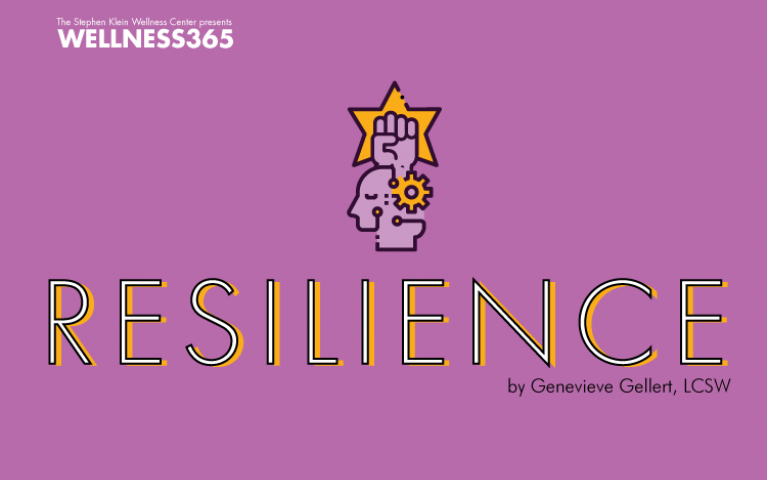Wellness365: Resilience

Adversity, pain, suffering, and trauma can displace us from the home within ourselves— whether it be from racism, sexual- and gender-based violence, any violence for that matter, poverty, personal catastrophe, natural disaster, lack of access to basic needs, homelessness, grief, classism, chronic or acute stress, ageism, ableism, or any of the other many systems of discrimination and oppression.
We all face trauma, adversity and / or other stressors—it’s a universal part of the human condition. It’s possible and often that we’re able to adapt to life-changing situations. Further, it’s possible to emerge even stronger.
This skill is called resilience— the process of adapting well in the face of adversity, trauma, tragedy, threats or significant sources of stress. Resilience may also yield times of profound growth and development.
Resilience is a muscle that we’re all capable of strengthening.
I realized recently in my own psychotherapy that there are two kinds of tired: one that requires rest and one that requires peace.
I realized this, of course, after a bout of muscle fatigue when my internal reserves were low, trauma burden high, sleep poor, and spirit spent. This peaked two weeks ago, when I said to myself, “[inhale expletive], it’s been a long week [exhale another expletive]” at 9:05 on a Monday morning. We’ve all been there...
Often we forget the accumulative toll that such hardships, coupled with the tasks of our lives, may take on us. Sometimes, we’re not even aware of the degree to which these ills may harm us. Awareness is both a gift and a privilege, a privilege that may not be safe for us to emotionally hold as frequently as popular culture promotes it, without the appropriate and corresponding protective factors outlined in the roadmap below.
Person-centered, trauma-informed care—a core, active practice at Project Home Healthcare Services for patients and staff—understands the prevalence of traumatic, adverse, and stressful experiences and reactions, creates conditions that promote healing, fosters trusting relationships, and enhances the possibility of interpersonal and cultural change and growth, through the lens of unconditional positive regard, a form of radical acceptance.
I identify much more strongly as a social worker than as a behavioral health consultant. In turn, a healthy dose of curiosity infused with the principle of unconditional positive regard— a concept developed by the humanistic psychologist Carl Rogers, which is the basic acceptance and support of a person regardless of what the person says or does— is my guiding light.
Person-centered, trauma-informed care solicits resilience from the often tired and tried human condition by understanding coping through the lenses of curiosity and unconditional positive regard.
It’s probably more effective to refer to my role as a behavioral health detective, rather than a behavioral health consultant. In my work, I am far less concerned with the degree to which a coping strategy is “good,” “bad,” “healthy,” or “unhealthy,” as I am much more non-judgmentally preoccupied with how the strategy is being used, the degree to which it’s objectively safe for self and others, and how it is, or isn’t, meaningful to the person using it. I apply this to myself, as well.
All coping strategies are behaviors aimed at protection and safety to ease adversity, pain, suffering, stress, and trauma—behaviors like eating disorders, substance use, hurting others, self-harm, distrust, introversions, extroversions, prayer, meditation, hobbies, avoiding the doctor, going to the doctor, Netflix, chill, Netflix and chill, daily exercise, and the list goes on.
"A 4-step roadmap to cultivating resilience"
The American Psychological Association recommends the following 4-step roadmap to cultivating resilience, anchored in a classic cognitive-behavioral framework, as it covers the twists and turns of our feelings, thoughts, and behaviors—a roadmap to discovering our most authentic forms of coping to unleash our deepest, most empowered selves:
Connection: Prioritize relationships; engage in group activities
Purpose: Practice developing SMART goals, engaging in meaningful activities, look for opportunities for self-discovery
Thoughts: Seek help with a therapist to learn from the past, embrace the present, and prepare for the future; practice accepting change; engage in intentional self-care
Wellness: Make a doctor’s appointments, seek help with a therapist; take care of your mind-body-spirit; practice mindfulness